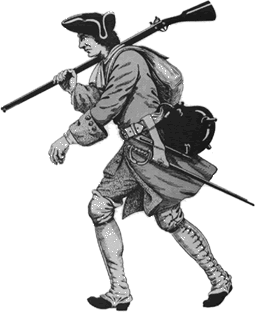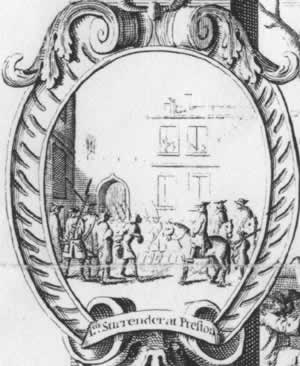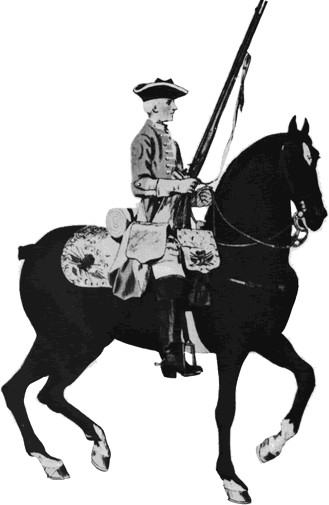The Battle of Preston
 General Wills, commander of the Government forces in Chester, was a far more formidable opponent than the militia colonels, bishops and local dignitaries the Jacobites had so far encountered on their march south. He had a considerable number of regular troops available to him: six regiments of horse and one of foot, and Carpenter hurrying south to join him.
General Wills, commander of the Government forces in Chester, was a far more formidable opponent than the militia colonels, bishops and local dignitaries the Jacobites had so far encountered on their march south. He had a considerable number of regular troops available to him: six regiments of horse and one of foot, and Carpenter hurrying south to join him.
With the help of Sir Henry Houghton, local Whig MP, he could also count on the help of a large and well motivated militia. He had already garrisoned Warrington Bridge and Manchester against the Jacobites; again their intelligence had let them down. Although they were told that Wills was closing in on them, the Jacobites, who had reached Preston on the 9 November, spent their time feasting and enjoying the riches of the town. On the evening of 11th, the Jacobite leaders were informed Wills was closing rapidly on the town. The army was stood to and an immediate Council of War held. Forster scorned the warnings of Wills's approach, saying that the Lancastrian Catholics had promised the safety of the Jacobite army, but next morning Wills's army was seen approaching the town from the south.
On the evening of 11th, the Jacobite leaders were informed Wills was closing rapidly on the town. The army was stood to and an immediate Council of War held. Forster scorned the warnings of Wills's approach, saying that the Lancastrian Catholics had promised the safety of the Jacobite army, but next morning Wills's army was seen approaching the town from the south.
There is some controversy as to what happened next. Forster and Mackintosh fought, both claiming later that they ordered the other to sent out cavalry to hold the bridge over the Ribble, which Wills would have to cross. In the end, Derwentwater's detachment sent out for this purpose were withdrawn and Forster retired to his quarters in a huff. Widdrington followed him with a bad case of gout which kept him in bed all day. Left in command, Mackintosh decided to reinforce the streets of the town and force Wills's men to come to close quarters.
At about midday Wills's men crossed the bridge, and at two o'clock the first assault was launched.  Street fighting continued until nightfall. The Jacobites fought fiercely and drove off every assault, inflicting heavy casualties. Mackintosh wrote to Mar, announcing his confidence of a victory next day.
Street fighting continued until nightfall. The Jacobites fought fiercely and drove off every assault, inflicting heavy casualties. Mackintosh wrote to Mar, announcing his confidence of a victory next day.
During the night, however, the situation changed completely. General Carpenter, with three regiments of dragoons and some infantry, arrived. Preston was soon encircled. Prompted by Widdrington and Oxburgh, but without consulting the Scots, Forster tried to negotiate terms with Wills.
The Scots, and many of the Northumbrians, were furious. Mackintosh and Forster were given until the next morning to reach a joint decision. In a poisonous atmosphere, the Council of War finally accepted that surrender was inevitable. On the morning of 14 November 1,500 Jacobites laid down their arms. The Jacobite army had suffered only seventeen fatalities, two of whom were Northumbrians. The 1715 Rising in England was over, and the rebels made prisoner.

A Government Dragoon like those commanded
by General Carpenter at Preston.